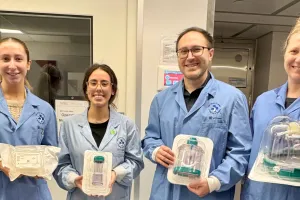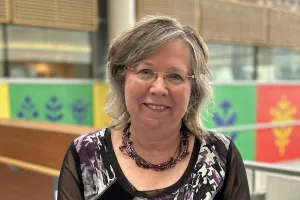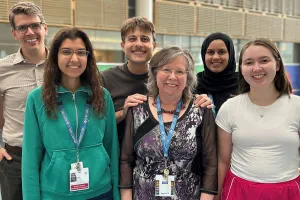First made-in-Canada CAR-T therapy gives lymphoma patient a third chance
 "At my check-up 30 days after getting my T-cells back, I was almost clear of cancer. I was gobsmacked," says Owen Snider, shown with wife Judith.When Owen Snider faced the news that his lymphoma had returned for the third time in ten years, he knew his options were running out.
"At my check-up 30 days after getting my T-cells back, I was almost clear of cancer. I was gobsmacked," says Owen Snider, shown with wife Judith.When Owen Snider faced the news that his lymphoma had returned for the third time in ten years, he knew his options were running out.
"I remember my oncologist saying they've done pretty much everything they could. I was given five or six months to live," he says.
However, one week later Owen received a lifeline. His oncologist at The Ottawa Hospital called to say that he might be eligible for a clinical trial of a promising new treatment called CAR-T therapy.
"I was very excited to be a part of the trial," says Owen, who lives with his wife Judith. "We're the kind of people where the glass is always half-full."
What is CAR-T therapy?
CAR T-cell therapy harnesses the power of a patient's own immune cells, known as T-cells, to treat their cancer. T-cells play a critical role in killing abnormal cells, such as cells infected by germs or cancer cells. But sometimes, cancerous cells become invisible to the T-cells that are meant to kill them. In CAR-T therapy, the T-cells are collected and reprogrammed in the lab to recognize and destroy the cancerous cells.
"This type of immunotherapy research is groundbreaking, and it's never been done in Canada before," explains Owen's hematologist Dr. Natasha Kekre, who is also a scientist at The Ottawa Hospital and associate professor at the University of Ottawa. "This is a therapy that uses a patient's own immune system. It's personalized medicine -- it's very individualized to each patient."
Pioneering a made-in-Canada approach
In 2016, Dr. Kekre and colleagues from The Ottawa Hospital, BC Cancer and BioCanRx came up with an ambitious plan to develop the first made-in-Canada CAR-T research platform. At the time, Canadian patients could only access CAR-T therapy by travelling to the U.S. While two kinds of CAR-T therapy are now approved for use in Canada, the team believes it is crucial to continue to develop and test made-in-Canada CAR-T therapy, including versions that might work even better or for more types of cancer.
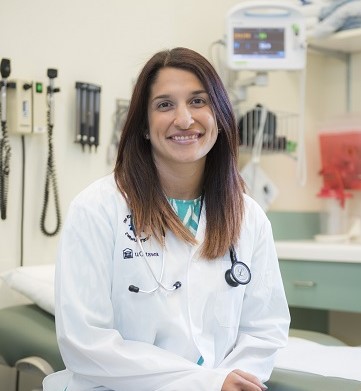 "Canadian cancer patients shouldn't have to wait for the research to be done elsewhere, but be able to participate in innovative clinical trials here at home," says Dr. Natasha Kekre."Canadian cancer patients shouldn't have to wait for the research to be done elsewhere, but be able to participate in innovative clinical trials here at home," says Dr. Kekre.
"Canadian cancer patients shouldn't have to wait for the research to be done elsewhere, but be able to participate in innovative clinical trials here at home," says Dr. Natasha Kekre."Canadian cancer patients shouldn't have to wait for the research to be done elsewhere, but be able to participate in innovative clinical trials here at home," says Dr. Kekre.
Biomanufacturing facilities enable life-saving research
To make their vision a reality, Dr. Kekre and her colleagues needed to manufacture large amounts of highly pure virus to deliver the chimeric antigen receptor (CAR) gene to patients' T-cells. The Ottawa Hospital's Biotherapeutics Manufacturing Centre was ideally positioned for the task, having manufactured more than a dozen different virus- and cell-based products for clinical trials around the word. BC Cancer's Conconi Family Immunotherapy Lab took care of combining the virus with the patient's cells to create the CAR-T cells.
The trial, called CLIC-1901, opened at The Ottawa Hospital and BC Cancer in 2019.
Did the CAR T therapy work?
One month after the treatment, Owen and Judith received some exceptional news. "At my check-up 30 days after getting my T-cells back, I was almost clear of cancer. I was gobsmacked," he says.
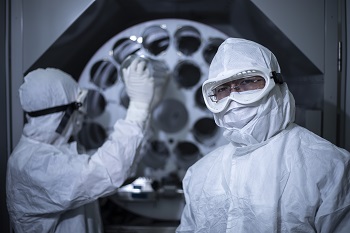 The Ottawa Hospital's Biotherapeutics Manufacturing Centre is the only facility in the country that can make the virus needed to create CAR-T cells.By the three-month mark, Owen says he was as "clean as a whistle." Eighteen months later, there is still no sign of lymphoma.
The Ottawa Hospital's Biotherapeutics Manufacturing Centre is the only facility in the country that can make the virus needed to create CAR-T cells.By the three-month mark, Owen says he was as "clean as a whistle." Eighteen months later, there is still no sign of lymphoma.
For Dr. Kekre, giving patients like Owen new hope for the future is what inspires her. "He's had multiple scans since then that show the same thing. And that's the reality of why I do this, because patients like him who had no options before, could soon have the option of CAR-T therapy. That's what happened for Owen and that's what we hope will happen for many more patients," says Dr. Kekre.
Dr. Kekre and her team hope to publish preliminary results of the trial in 2022 and they are already planning a trial of another kind of CAR-T therapy.
This research is supported by BioCanRx, the Canadian Institutes of Health Research, The Ottawa Hospital Foundation, BC Cancer, the Ontario Institute for Cancer Research, the Canada Foundation for Innovation and the Ontario Research Fund. Team members include Drs. Natasha Kekre, Harold Atkins, John Bell, Kevin Hay, Rob Holt, Brad Nelson, John Webb, Manoj Lalu, Kednapa Thavorn, Dean Fergusson, Justin Presseau and Jen Quizi.
Learn more about:
The Ottawa Hospital is a leading academic health, research and learning hospital proudly affiliated with the University of Ottawa and supported by The Ottawa Hospital Foundation.
